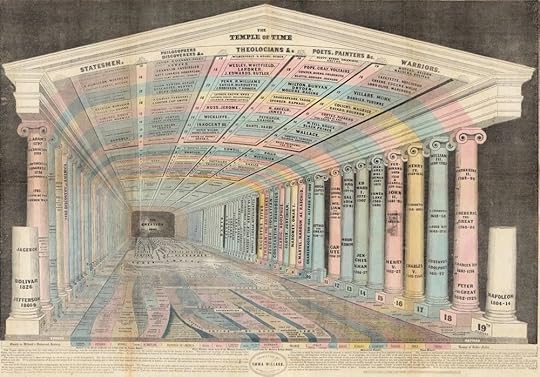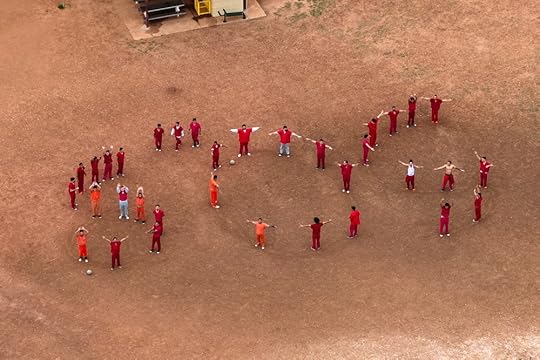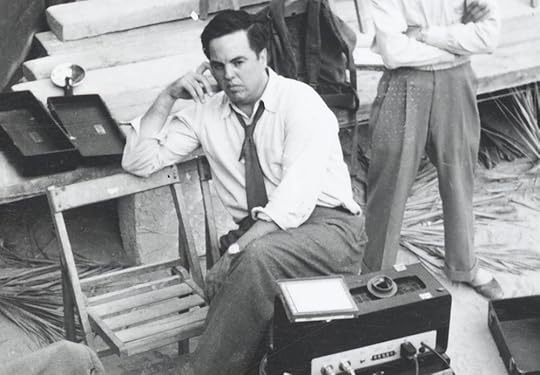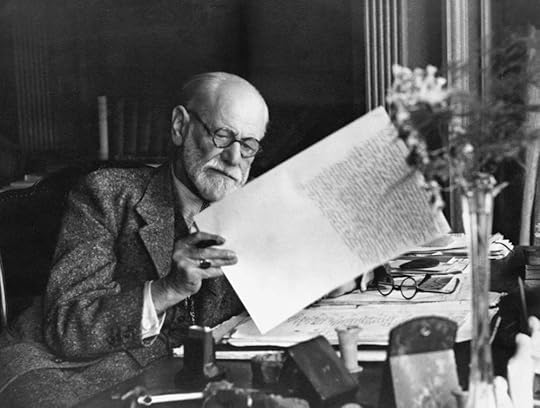Michael J. Kramer's Blog, page 2
August 6, 2025
Syllabus—The History of History
 Emma Willard, The Temple of Time, 1846.Instructor info
Emma Willard, The Temple of Time, 1846.Instructor infoDr. Michael J. Kramer, Department of History, SUNY Brockport, mkramer@brockport.edu.
Who is your instructor?Michael J. Kramer specializes in modern US cultural and intellectual history, transnational history, public history, digital humanities, and cultural criticism. He is an associate professor of history at the State University of New York (SUNY) Brockport, the author of The Republic of Rock: Music and Citizenship in the Sixties Counterculture (Oxford University Press, 2013), and the director of the Berkeley Folk Music Festival Project. He is currently working on a history of the 1976 United States bicentennial celebration and a study of folk music, technology, and cultural democracy in the United States. He edits The Carryall, an online journal of US cultural and intellectual history and maintains a blog of cultural criticism, Culture Rover. His website, with additional information about publications, projects, courses, talks, and more can be found at michaeljkramer.net.
What are we up to?History, at first, seems like a simple proposition. It’s what happened. Right away, however, the questions get thornier. Happened to whom? Happened where? Who is telling the story? From where are their facts coming? How are they putting those facts together? What questions or perspectives are they bringing to their telling of the past? Why should we care? In this course, we delve into these more difficult issues to deepen our collective understanding of historical knowledge and the methods that can be used to pursue it. We cannot cover everything in this semester-long history of history, but we can start to open the topic for scrutiny. We can begin to frame and define our understanding of history and historical practice. To do so, we will focus on two rich, complex books about history and historical methodology. Students will also begin to refine their own research skills as practitioners of historical inquiry through the development of a prospectus for their capstone project in the SUNY Brockport Masters of History graduate program.
Things you are expected to do this termBy taking this course you are agreeing to do the following to the best of your abilities:
Complete the readings.Come to class prepared.Participate in discussions in class through both comments and listening to and responding to others.Complete the assignments.Be respectful of yourself, your instructor, and your fellow students.This is a hybrid synchronous course. If you are attending online, please find a quiet place with a good internet connection to join the course; keep your camera on and use a headset if possible.Required booksMaza, Sarah C. Thinking about History. Chicago: University of Chicago Press, 2017.Novick, Peter. That Noble Dream: The “Objectivity Question” and the American Historical Profession. New York: Cambridge University Press, 1988.ScheduleUNIT I: “History never repeats itself, but it does rhyme”August 25Week 01: Introductions—What Is History, Anyway?
Reading:Maza, IntroductionThomas Andrews and Flannery Burke. “What Does It Mean to Think Historically?,” Perspectives on History, January 2007Earls, Averill, Elizabeth Garner Masarik, Sarah Handley-Cousins, and Marissa C. Rhodes. “What about Continuity?” Perspectives on History, Spring 2024September 01Week 02: No Class—Labor Day
Assignment:Student IntroductionSeptember 08Week 03: The History of Whom? The History of Where—Capstone Prospectus Development 01: Imagining
Reading: Maza, Introduction, Chapters 1-2Assignments:What Is History? Assignment 01Capstone Prospectus Development 01: ImaginingSeptember 15Week 04: How Is History Produced?—Research Skills 01
Reading: Maza, Chapter 4Assignments:What Is History? Assignment 02September 22Week 05: Causes or Meanings—Research Skills 02
Reading: Maza, Chapter 5Assignments:What Is History? Assignment 03September 29Week 06: Facts or Fictions—Capstone Prospectus Development 02: Sketching
Reading: Maza, Chapter 6, ConclusionAssignments:What Is History? Assignment 04Capstone Prospectus Development 02: SketchingUNIT II: “Nailing jelly to the wall”October 06Week 07: Objectivity enthroned
Reading: Novick, Preface-Part 1October 13Week 08: No Class—Fall Break—Capstone Prospectus Development 03: First Draft
Assignment (due Friday October 17)Capstone Prospectus Development 03: First DraftOctober 20Week 09: Objectivity besieged—Research Skills 03
Reading: Novick, Part 2Assignments:What Is History? Assignment 05October 27Week 10: Objectivity reconstructed — Research Skills 04
Reading: Novick, Part 3Assignments:What Is History? Assignment 06November 03Week 11: Objectivity in crisis—Capstone Prospectus Development 04: Second Draft
Reading: Novick, Part 4Assignments:Capstone Prospectus Development 04: Second DraftWhat Is History? Assignment 07UNIT III: Prospecting for historyNovember 10Week 12: Capstone Prospectus Workshop 01
Assignments:Capstone Prospectus Development 05: Presentation OutlineNovember 17Week 13: Capstone Prospectus Workshop 02
November 24Week 14: No Class—Thanksgiving Break
December 01Week 15: Final Reflections, Future Directions
December 15Final Assignments
Capstone ProspectusWhat Is History? Assignment Compilation and Final ReflectionsAssignments and evaluationsAll assignments due by Saturday, midnight except where noted.
Student Introduction = 5%What Is History? Assignments and Seminar Participation = 7 x 5% = 35%Capstone Prospectus Development = 5 x 5% = 25%01: Imagining 02: Sketching03: First Draft04: Second Draft05: Presentation OutlineCapstone Prospectus = 25%What Is History? Assignment Compilation Into Final Reflections = 10%RubricYes! = A-level work.
on-time submission of assignmentsfor class meetings, regular attendance and timely preparation overall, plus insightful, constructive, respectful, and regular participation in class discussionsa thorough understanding of required course materials as expressed in seminar meeting participationFor writing assignments:accurate, clear, well-written responses to prompts when relevanta credible, persuasive argument of originalityargument persuasively supported by relevant, accurate, and clearly explicated evidencepersuasive integration of argument and evidence in an insightful overall analysisexcellent organization: introduction, topic sentences, coherent paragraphs, use of evidence, contextualization, analysis, smooth transitions, conclusiongraceful, clear, logical prose style with effective word choice, avoidance of clichés, and free of spelling and grammatical errorscorrect page formatting when relevant, with regular margins, double spaced, and 12-point fontaccurate formatting of footnotes and, when required, bibliography with required citation and documentation using Chicago Manual of Style guidelines
Getting Closer = B-level work, It is good, but with minor problems in one or more areas that need improvement.
Needs Work = C-level work is acceptable, but with major problems in several areas or a major problem in one area.
Needs A Lot of Work = D-level work. It shows major problems in multiple areas, including missing or late assignments, missed class meetings, and other shortcomings.
Nope = E-level work is unacceptable. It fails to meet basic course requirements and/or standards of academic integrity/honesty.
Citation and style guide: Using Chicago Manual of StyleHistorians generally use Chicago Manual of Style for citation, bibliography, and formatting. Please familiarize yourself with Chicago Manual of Style.
There is a nice overview of citation at the Chicago Manual of Style websiteFor additional, helpful guidelines, visit the Drake Memorial Library’s Chicago Manual of Style pageYou can always go right to the source: the Chicago Manual of Style is available for reference at the Drake Memorial Library Reserve DeskWriting consultationWriting Tutoring is available through the Academic Success Center. It will help at any stage of writing. Be sure to show your tutor the assignment prompt and syllabus guidelines to help them help you.
Research consultationThe librarians at Drake Memorial Library are an incredible resource. You can consult with them remotely or in person. To schedule a meeting, go to the front desk at Drake Library or visit the library website’s Consultation page.
Attendance policyYou will certainly do better with evaluation in the course, learn more, and get more out of the class the more you attend meetings, participate in discussions, complete readings, and finish assignments. That said, lives get complicated. Therefore, you may miss up to three class meetings, with or without a justified reason, with no penalty. You do not need a note from a doctor, but feel free to notify the instructor of your absence. If you are ill, please stay home and take precautions if you have any covid or flu symptoms. Moreover, masks are welcome in class if you are still recovering from illness or feel sick. After three absences, subsequent absences will result in reduction of final course grade at the discretion of the instructor. Please note: the instructor does not offer extra credit in this course.
Disabilities and accommodationsIn accordance with the Americans with Disabilities Act and Brockport Faculty Senate legislation, students with documented disabilities may be entitled to specific accommodations. SUNY Brockport is committed to fostering an optimal learning environment by applying current principles and practices of equity, diversity, and inclusion. If you are a student with a disability and want to utilize academic accommodations, you must register with Student Accessibility Services (SAS) to obtain an official accommodation letter which must be submitted to faculty for accommodation implementation. If you think you have a disability, you may want to meet with SAS to learn about related resources. You can find out more about Student Accessibility Services or by contacting SAS via the email address sasoffice@brockport.edu or phone number (585) 395-5409. Students, faculty, staff, and SAS work together to create an inclusive learning environment. Feel free to contact the instructor with any questions.
Discrimination and harassment policiesSex and Gender discrimination, including sexual harassment, are prohibited in educational programs and activities, including classes. Title IX legislation and College policy require the College to provide sex and gender equity in all areas of campus life. If you or someone you know has experienced sex or gender discrimination (including gender identity or non-conformity), discrimination on the basis of sexual orientation or pregnancy, sexual harassment, sexual assault, intimate partner violence, or stalking, we encourage you to seek assistance and to report the incident through these resources. Confidential assistance is available on campus at Hazen Center for Integrated Care. Another resource is RESTORE. Note that by law faculty are mandatory reporters and cannot maintain confidentiality under Title IX; they will need to share information with the Title IX & College Compliance Officer.
Statement of equity and open communicationWe recognize that each class we teach is composed of diverse populations and are aware of and attentive to inequities of experience based on social identities including but not limited to race, class, assigned gender, gender identity, sexuality, geographical background, language background, religion, disability, age, and nationality. This classroom operates on a model of equity and partnership, in which we expect and appreciate diverse perspectives and ideas and encourage spirited but respectful debate and dialogue. If anyone is experiencing exclusion, intentional or unintentional aggression, silencing, or any other form of oppression, please communicate with me and we will work with each other and with SUNY Brockport resources to address these serious problems.
Disruptive student behaviorsPlease see SUNY Brockport’s procedures for dealing with students who are disruptive in class.
Emergency alert systemIn case of emergency, the Emergency Alert System at The College at Brockport will be activated. Students are encouraged to maintain updated contact information using the link on the College’s Emergency Information website.
July 31, 2025
Rovings
 Detainees form the letters SOS with their bodies in the courtyard at the Bluebonnet detention facility in Anson, Texas, 28 April 2025. Photo: Paul Ratje/Reuters.SoundsAndrew Hill, Grass RootsMountain Brews, Mountain BrewsEllen Steckert, Go Around Songs Vol. 1Rabbitology, “Joanie”Walking the Camino, Ramblings, BBC SoundsDavid Runciman, Past Present FutureCarrie Brownstein with David Remnick, “Carrie Brownstein on a Portrait of Cat Power by Richard Avedon,” 11 July 2025Notes on the New Regime w/ Aslı Bâli & Gabriel Winant, The Dig, 11 July 2025Words“Venezuelan Detainees at Texas Center Spell out SOS with Their Bodies,” The Guardian, 30 April 2025Nick Burns, Tom Wolfe’s Sociology of the Weird, The Nation, 8 July 2025Richard Brody, “In Defense of the Traditional Review,” New Yorker, 24 July 2025Damon Krukowski, “Units,” Dada Drummer Almanach, 25 July 2025Diep Tran, “New York Times Chief Theatre Critic Jesse Green to Be Reassigned; Paper Searching for New Critic.” Playbill, 16 July 2025Gabriel Kahane, “A Love Letter to Music Listings,” The Atlantic, 27 July 2025G.D. Dess, “Two Roads for the Literary Critical Elite,” Metropolitan Review, 23 February 2025Jackson Lears, “The Righteous Community,” London Review of Books, 24 July 2025Phillip Lopate, “Freud the Essayist,” Threepenny Review 173 (Spring 2023): 8–12Neko Case, “Neko Case on Why Sinéad O’Connor Matters as Much Today as She Ever Did,” Literary Hub, 24 July 2025Susan Choi, “My Days as a Fact-Checker at The New Yorker,” The Yale Review, 9 June 2025James Chandler, “A Trumped-Up Spectacle,” Los Angeles Review of Books, 9 July 2025Sophia Goodfriend, “Deadly Slop,” The Baffler, 10 July 2025Greil Marcus, “When First Unto This Country: Bob Dylan and the Little Sandy Review,” Letter in the Ether_, 31 July 2025Friedman, Samantha, et. al., Lincoln Kirstein’s ModernRon Chernow, Mark TwainBrian O’Doherty, et. al., Christo and Jeanne-Claude: Remembering the Running FenceAustin Kelley, The Fact CheckerMeghan O’Rourke, “The Seductions of A.I. for the Writer’s Mind,” New York Times, 18 July 2025Andrew Perchuk, Emily Pugh, and Zanna Gilbert, eds. Ed Ruscha’s Streets of Los Angeles. 2025Cindy King, “No Context,” Threepenny Review, Summer 2022WallsWeathering the Landscape: Ellen Levine Dodd and Karen Olsen-Dunn @ Gualala Arts CenterElectric Dreams Art and Technology Before the Internet @ Tate ModernJanice Redman, Rough Alchemy @ Bookstein ProjectsTavares Strachan, Starless Midnight @ Marian Goodman Gallery
Warp and Weft: Technologies within Textiles
@ The ShepherdHaegue Yang, Lost Lands and Sunken Fields @ Nasher Sculpture CenterCarl Cheng, Nature Never Loses @ Institute of Contemporary ArtHélène de Beauvoir, The Woman Destroyed @ Amar GalleryLeonora Carrington, Mythopoesis @ Gallery Wendi NorrisJim Condron, Collected Things @ New York Studio School GalleryStagesOpening Weekend Concert with Wadada Leo Smith and Raven Chacon @ Academy of Arts and Letters, 28 September 2024Crooked Mouth + Bob Eisen @ Constellation Chicago, 19 July 2025Jeb Bishop Quintet @ Constellation Chicago, 18 July 2025Improvised Music Series: Jeff Kimmel / Sharon Udoh @ Elastic Arts, 24 July 2025Elle Sofe Company @ Jacob’s Pillow, 24 July 2025ScreensSteve Paxton: A Video Amble, Dancespace ProjectSteve Paxton and Lisa Nelson, PA RT (1983)
Christo’s Running Fence
Renaissance: The Blood and the Beauty
Detainees form the letters SOS with their bodies in the courtyard at the Bluebonnet detention facility in Anson, Texas, 28 April 2025. Photo: Paul Ratje/Reuters.SoundsAndrew Hill, Grass RootsMountain Brews, Mountain BrewsEllen Steckert, Go Around Songs Vol. 1Rabbitology, “Joanie”Walking the Camino, Ramblings, BBC SoundsDavid Runciman, Past Present FutureCarrie Brownstein with David Remnick, “Carrie Brownstein on a Portrait of Cat Power by Richard Avedon,” 11 July 2025Notes on the New Regime w/ Aslı Bâli & Gabriel Winant, The Dig, 11 July 2025Words“Venezuelan Detainees at Texas Center Spell out SOS with Their Bodies,” The Guardian, 30 April 2025Nick Burns, Tom Wolfe’s Sociology of the Weird, The Nation, 8 July 2025Richard Brody, “In Defense of the Traditional Review,” New Yorker, 24 July 2025Damon Krukowski, “Units,” Dada Drummer Almanach, 25 July 2025Diep Tran, “New York Times Chief Theatre Critic Jesse Green to Be Reassigned; Paper Searching for New Critic.” Playbill, 16 July 2025Gabriel Kahane, “A Love Letter to Music Listings,” The Atlantic, 27 July 2025G.D. Dess, “Two Roads for the Literary Critical Elite,” Metropolitan Review, 23 February 2025Jackson Lears, “The Righteous Community,” London Review of Books, 24 July 2025Phillip Lopate, “Freud the Essayist,” Threepenny Review 173 (Spring 2023): 8–12Neko Case, “Neko Case on Why Sinéad O’Connor Matters as Much Today as She Ever Did,” Literary Hub, 24 July 2025Susan Choi, “My Days as a Fact-Checker at The New Yorker,” The Yale Review, 9 June 2025James Chandler, “A Trumped-Up Spectacle,” Los Angeles Review of Books, 9 July 2025Sophia Goodfriend, “Deadly Slop,” The Baffler, 10 July 2025Greil Marcus, “When First Unto This Country: Bob Dylan and the Little Sandy Review,” Letter in the Ether_, 31 July 2025Friedman, Samantha, et. al., Lincoln Kirstein’s ModernRon Chernow, Mark TwainBrian O’Doherty, et. al., Christo and Jeanne-Claude: Remembering the Running FenceAustin Kelley, The Fact CheckerMeghan O’Rourke, “The Seductions of A.I. for the Writer’s Mind,” New York Times, 18 July 2025Andrew Perchuk, Emily Pugh, and Zanna Gilbert, eds. Ed Ruscha’s Streets of Los Angeles. 2025Cindy King, “No Context,” Threepenny Review, Summer 2022WallsWeathering the Landscape: Ellen Levine Dodd and Karen Olsen-Dunn @ Gualala Arts CenterElectric Dreams Art and Technology Before the Internet @ Tate ModernJanice Redman, Rough Alchemy @ Bookstein ProjectsTavares Strachan, Starless Midnight @ Marian Goodman Gallery
Warp and Weft: Technologies within Textiles
@ The ShepherdHaegue Yang, Lost Lands and Sunken Fields @ Nasher Sculpture CenterCarl Cheng, Nature Never Loses @ Institute of Contemporary ArtHélène de Beauvoir, The Woman Destroyed @ Amar GalleryLeonora Carrington, Mythopoesis @ Gallery Wendi NorrisJim Condron, Collected Things @ New York Studio School GalleryStagesOpening Weekend Concert with Wadada Leo Smith and Raven Chacon @ Academy of Arts and Letters, 28 September 2024Crooked Mouth + Bob Eisen @ Constellation Chicago, 19 July 2025Jeb Bishop Quintet @ Constellation Chicago, 18 July 2025Improvised Music Series: Jeff Kimmel / Sharon Udoh @ Elastic Arts, 24 July 2025Elle Sofe Company @ Jacob’s Pillow, 24 July 2025ScreensSteve Paxton: A Video Amble, Dancespace ProjectSteve Paxton and Lisa Nelson, PA RT (1983)
Christo’s Running Fence
Renaissance: The Blood and the Beauty
July 30, 2025
2025 November 08—More Ideas

This roundtable at the 2025 Society for US Intellectual History Conference in Detroit features a discussion of digital futures for writing about US cultural and intellectual history by way of a focus on the new online journal The Carryall. Contributors to the journal’s inaugural roundtable, “More (and Sometimes More Important) Ideas That Made America,” will offer brief reflections followed by an open conversation with all attendees. Panelists include:
Audrey Wu Clark, United States Naval AcademyEmily Hawk, Dickinson CollegeGuy Emerson Mount, Wake Forest UniversityRichard Cándida Smith, University of California, BerkeleyWith a comment from Sandy Zipp, Brown University2025 November 07—A Province to Intensify
 Ellen Willis, 1968.
Ellen Willis, 1968.Delighted to chair a roundtable on intellectual histories of cultural criticism in the twentieth century at the 2025 Society for US Intellectual History (S-USIH) Conference in Detroit. The roundtable will feature:
Joan Rubin, University of RochesterSheila Foster, University of RochesterRonnie Grinberg, University of OklahomaJuliana DeVaan, Columbia University2025 August 21—Fronteiras musicais em movimento
 Alan Lomax recording at the Palma Festival, Mallorca, Spain, June 1952. From the Alan Lomax Collection at the American Folklife Center, Library of Congress. Courtesy of the Association for Cultural Equity.
Alan Lomax recording at the Palma Festival, Mallorca, Spain, June 1952. From the Alan Lomax Collection at the American Folklife Center, Library of Congress. Courtesy of the Association for Cultural Equity.I will be speaking about “The Transatlantic Ballad of Alan Lomax” at “O pós-Segunda Guerra e o redesenho do mundo: modernismos transatlânticos,” SESC, São Paulo, 21 August 2025.
July 28, 2025
The Magic Words
 Sigmund Freud reviews and edits his manuscript for Moses and Monotheism, published in 1939. Photo: by Library of Congress/Corbis/VCG via Getty Images.
Sigmund Freud reviews and edits his manuscript for Moses and Monotheism, published in 1939. Photo: by Library of Congress/Corbis/VCG via Getty Images.Words were originally magic and to this day words have retained much of their magical power. By words one person can make another blissfully happy or drive him to despair, by words the teacher conveys his knowledge to his pupils, by words the orator carries his audience with him and determines their judgements and decisions. Words provoke affects and are in general the means of mutual influence among men. Thus we shall not depreciate the use of words….
— Sigmund Freud, Introductory Lectures on Psycho-Analysis
All in the Details

Some details, irrelevant in themselves, become more significant when they pile up. …One ‘telling detail’ doesn’t tell us much, but a succession of dozens of details work in concert creates an impression, and impressions are sometimes as powerful as declarations of fact.
— Protagonist in Austin Kelley’s The Fact Checker
Trying This & Trying That
 Engravings from Isaac Fuller and Pierce Tempest, Iconologia: or, moral emblems …. Wherein are express’d various images of virtues, vices, passions, etc. as design’d by the ancient Egyptians, Greeks, Romans, and modern Italians … / illustrated with … humane figures, with their explanations; newly design’d, and engraven … by I. Fuller … and other masters, 1709. Credit: Wellcome.
Engravings from Isaac Fuller and Pierce Tempest, Iconologia: or, moral emblems …. Wherein are express’d various images of virtues, vices, passions, etc. as design’d by the ancient Egyptians, Greeks, Romans, and modern Italians … / illustrated with … humane figures, with their explanations; newly design’d, and engraven … by I. Fuller … and other masters, 1709. Credit: Wellcome.…all authority and authenticity, all the enchantments of a story’s voice, just as in dance, in photography, in film and sculpture, arise not from some semi-sacred central mass, but from the outside in: from unplanned impulse, from luck, sometimes—okay—from design and application, but always from trying this and trying that. From hit or miss. It’s how artifice works, and it is not so different from how we make life be life.
— Richard Ford, “Whose Voice?,” Threepenny Review, Summer 2023
July 21, 2025
Salty

People might claim to believe in this or that, but in the four a.m. version of themselves, most possess no fixed idea on how society should be organized. When people face themselves, alone, the passions they have been busy performing all day, and that they rely on to reassure themselves that they are who they claim to be, to reassure their milieu of the same, those things fall away.
What is it people encounter in their stark and solitary four a.m. self? What is inside them? Not politics. There are no politics inside of people.
The truth of a person, under all the layers and guises, the significations of group and type, the quiet truth, underneath the noise of opinions and ‘beliefs,’ is a substance that is pure and stubborn and consistent. It is a hard, white salt.
This salt is the core. The four a.m. reality of being.
— Sadie Smith, narrator of Rachel Kushner’s Creation Lake
Turn Out the Base

The Republican Party of today has a base. Call it MAGA. Call it something else. Whatever you call it, you’ll typically imagine it as a “base.” The recent controversy over Donald Trump’ relationship to Jeffrey Epstein revealed that even Trump cannot escape its orbit. Trumpublicanism is not only a top-down movement that will always follow its leader. To be sure it is still an authoritarian movement, but it is paradoxically a bottom-up, populist one as much as a top-down, directed one. Or better said, the right today stitches together a winning coalition that appears to be driven by—and ultimately beholden to—its base, which is not moderate, but hardline and radical in its reactionary fervor. Much reporting on Trump and MAGA focuses on this base: who is in it? What do they want?
Yet reporting on the left hardly ever speaks of a base. Instead the language is of constituencies and interest groups: different ethnic groups, educational sectors, class positions, policy perspectives, education levels, and generations. On the left, the framework is not a focus on rabid reactionary base and its demands in the least. Instead, the focus is on a splintered, fragmented coalition of interests, (which was actually always something of a quality of the Democratic Party in US political history). More fascinatingly, while the Republican right is driven by an amorphous mass base of populist reactionary politics, the Democratic Party seems to be driven more by a strange kind of rabid elite of moderates.
This framework could best be recognized by the backlash and panic to incursions into the Democratic Party by Bernie Sanders and the Democratic Socialists of America since 2016. Remember that it was Sanders’s incursions into the Democratic Party from the left that oddly paralleled the rise of MAGA on the right. Yet Sanders, the “Squad,” and groups such as the Democratic Socialists of America are almost never thought of as a base. They are thought of as a radical fringe that has to be pushed away by the base of moderate centrist “New Democrats” (think Bill Clinton, Hillary Clinton, Barack Obama, Joe Biden or so-called “Blue Dog” Democrats or the commentaries of James Carville).
To call this wing of the Democratic Party moderates, however, is really not accurate. For while centrist Democrats expect the leftwing of the party always to fall in line when their candidates win (as with Joe Biden in the 2020 presidential election), when more leftwing candidates themselves emerge victorious from Democratic primaries, centrists refuse to fall in line behind these victors. To wit, witness the primary election victory of Democratic New York City mayoral candidate Zohran Mamdani. Did centrists unify behind him when he trounced centrist Andrew Cuomo for the Democratic mayoral candidacy? No, instead they are reconfiguring behind Cuomo as an independent candidate or, worse, some are backing corrupt incumbent Eric Adams, who is now a veritable pawn of Trump. That’s hardly “moderate” at all. Its a divisive form of moderation, and so different from what seems to happen on the right in the Republican Party. It is a dynamic far more twisted and strange.
Why this difference between perceptions of the “base”? Does it have to do with the kinds of assumptions analysts bring to the meaning of a political core to the right as compared to the left? If the Democrats increasingly are the party of the more highly educated and affluent, does that not count as a base because of histories of how we analyze class (a base had to be found among the working classes or the masses?)? Must a base always be a force for radicalization? Can a base ever stabilize? What is the meaning of being radical, reactionary, or moderate when the base operates in such different modes across the political spectrum? And who is assumed not to be the base in these political formations? Who so?
The different treatment of the base in the Republican and Democratic Parties asks us to think more critically about characterizations of political “bases.” Republicans today are ostensibly pushed ever rightward by a framework of a radicalized base. Democrats are forever paralyzed from moving leftward by a model of constituencies, special interest groups, and a centrist “moderate” group that is hardly moderate, that howls for acquiescence and obedience even when it loses.
What does that suggest? It suggests that in the 2020s perhaps we might question the basics of what makes a base. We might use fewer assumptions about what it is, how it functions, what makes it foundational or not. We might rethink it in new, better, and more vertiginous ways.



